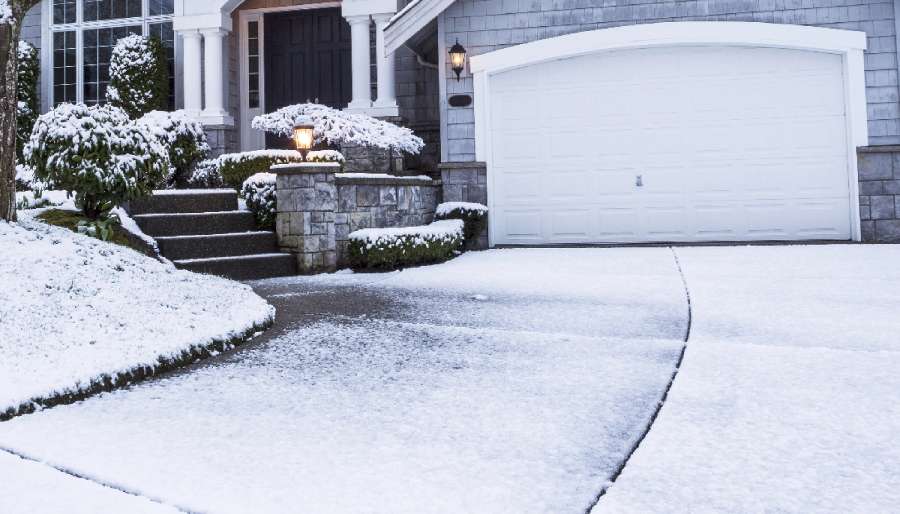As winter approaches in Morris County, homeowners and business owners alike must take steps to protect their asphalt driveways from the harsh conditions that freezing temperatures, snow, and ice bring.
Asphalt, while durable, can suffer damage if not properly maintained, especially in the winter months when temperature fluctuations and moisture become the biggest threats.
This guide provides a professional overview of the best practices for maintaining your asphalt driveway during the harsh Morris County winters.
By following these tips, you can prolong the life of your driveway, ensure its appearance stays intact, and avoid costly repairs.
Introduction
Winter in Morris County brings picturesque snowfalls but also poses significant challenges for your asphalt driveway.
Without proper care, your driveway can suffer from cracks and potholes caused by freezing temperatures, snow accumulation, and ice formation.
In this paving guide, we will explore the essential steps for maintaining your asphalt driveway during winter, positioning your local paving company as an expert in ensuring the longevity and durability of this vital surface.
Why Winter Weather is Harsh on Asphalt
Asphalt driveways are particularly vulnerable during the New Jersey winter due to the combination of freezing temperatures and moisture.
Cold weather causes the asphalt to contract, and any water trapped in cracks or on the surface can freeze and expand, leading to significant damage over time.
This freeze-thaw cycle, along with snow and ice buildup, can cause cracks to widen, create potholes, and lead to the deterioration of the surface.

Understanding the Freeze-Thaw Cycle
The freeze-thaw cycle is one of the biggest threats to asphalt driveways in cold climates.
When water seeps into cracks (even the smallest ones) and freezes, it expands and pushes the cracks further apart.
As temperatures rise and the ice/ snow melts, the cracks remain, creating openings for more water to enter.
This constant expansion and contraction weakens the asphalt over time, leading to larger and more costly damage.
Common Winter Damage to Asphalt Driveways
- Cracks: Freezing water expands and widens existing cracks.
- Potholes: Moisture trapped beneath the surface freezes and creates voids, leading to potholes.
- Erosion: Snowmelt can wash away parts of the driveway surface, leading to erosion and further damage.
- Surface deterioration: The combination of snow, ice, and deicing chemicals can wear down the asphalt surface.
Preparing Your Asphalt Driveway Before Winter Hits
Preparing your asphalt driveway for winter before the first snowfall is essential for preventing damage.
Pre-winter maintenance will help you minimize the impact of freezing temperatures and heavy snowfall. Here are a few key steps to take:
Sealcoating
Driveway sealcoating is one of the most effective ways to protect your asphalt before winter sets in.
A high-quality blacktop sealant acts as a barrier, prevents water from seeping into the surface and reducing the effects of the freeze-thaw cycle.
Sealcoating also protects against deicing chemicals and UV rays, extending the life of your driveway.
Why Sealcoating is Essential
Asphalt sealing adds a protective layer, shielding it from moisture, chemicals, and wear.
Without this barrier, water can penetrate the surface, freeze, and cause damage, leading to expensive repairs down the road.
For professional sealcoating services in Morris County, you can contact us today.
Repair Cracks and Potholes Early
It’s crucial to address any cracks or potholes in your driveway before winter arrives. Once water enters these openings and freezes, the damage will only worsen.
Hiring a professional paving contractor to repair cracks and potholes will ensure your driveway is in top shape for the cold months.
Avoiding Worsening Damage
Ignoring small cracks can lead to major problems.
Potholes are not only unsightly but also hazardous, especially when hidden under snow and ice.
By repairing these issues early, you avoid more extensive damage. For asphalt repairs near Boonton, NJ, visit Paving Services in Boonton.
Clear Debris Regularly
Keeping your driveway free of debris and clean before the first snowfall can help prevent water accumulation.
Leaves, dirt, and other debris can trap moisture, leading to ice formation that can damage your driveway.
The Importance of a Clean Surface
Regularly sweeping your driveway removes harmful debris that can trap moisture.
This simple step can go a long way in preventing winter-related damage. You can explore more maintenance tips from Paving Experts in Butler, NJ.

Using Deicing Products Wisely
While deicing products help keep your driveway safe during the winter, they can also cause damage if not used carefully.
Many deicers contain harsh chemicals that can break down the asphalt over time.
What to Avoid for Asphalt Health
Avoid using deicing products that contain magnesium chloride or calcium chloride, as these chemicals can accelerate the deterioration of your asphalt.
Instead, opt for cat litter and sand to improve traction on icy surfaces without damaging the driveway.
Proper Snow Removal Techniques
Proper snow removal is key to maintaining the health of your driveway during the winter.
Improper techniques can lead to cracks, scratches, or other damage.
Best Practices for Shoveling
Use a wood-handled plastic shovel instead of a metal one to avoid scratching the surface of the asphalt.
Additionally, be mindful of how deep you dig into the snow, as shoveling too aggressively can damage the top layer of your driveway.
For more snow removal tips and asphalt care advice, check with Chatham Borough Paving.
Maintaining Your Driveway Throughout the Winter
Winter maintenance doesn’t stop after the first snowfall.
To keep your driveway in excellent condition, ongoing care is necessary.
Regularly clearing snow, avoiding the overuse of deicing chemicals, and inspecting for signs of damage are all part of effective winter maintenance.
Ongoing Care During Freezing Conditions
Even during the coldest months, you should stay vigilant.
Keeping snow off your driveway and checking for cracks after each freeze-thaw cycle will help you catch problems early, preventing bigger issues down the line.
Post-Winter Care for Your Asphalt Driveway
Once winter ends, it’s time to inspect your driveway for any damage that may have occurred during the colder months.
Pay close attention to any new cracks, potholes, or surface deterioration, and schedule repairs as needed.
Inspecting for Damage
Walk the length of your driveway and look for signs of damage.
Early detection and professional repairs can help maintain the longevity of your asphalt and save you from costly replacements.
For driveway inspections in Denville, NJ, consult with Denville Paving Experts.

Professional Maintenance Services
To ensure your driveway is in the best possible condition, consider hiring a professional paving contractor for routine maintenance.
Experts have the tools and knowledge necessary to perform thorough inspections, repairs, and sealcoating.
The Role of Paving Contractors
Local paving contractors in Morris County are familiar with the unique challenges that winter weather poses to asphalt driveways.
By partnering with asphalt contractors, you can rest assured that your driveway will be well-protected throughout the winter.
For services in Chester Township, visit Paving Services in Chester.
Your Asphalt Driveway Can Go a Long Way
Maintaining your asphalt driveway during Morris County winters requires a proactive approach.
By sealcoating, repairing cracks, using deicing products wisely, and practicing proper snow removal techniques, you can prevent unwanted costly damage and extend the life of your driveway.
Taking these basic steps now will save you money and headaches in the future.
FAQs
How often should I sealcoat my asphalt driveway?
It’s recommended to sealcoat your asphalt driveway every 3 to 4 years to maintain its protective barrier and prolong its lifespan.
Can I use rock salt on my asphalt driveway?
While rock salt is effective at melting snow and ice, we don’t recommend it.
It can cause damage to your asphalt.
It’s better to use sand or non-corrosive deicers for safer results.
What is the best way to remove snow from my driveway?
Using a snow blower or a plastic shovel is the safest way to remove snow from your asphalt driveway without causing surface damage.
Why is it important to repair cracks before winter?
Repairing cracks before winter prevents water from entering and freezing within them, which could lead to wider cracks and potholes as the freeze-thaw cycle progresses.
When should I hire a professional paving contractor?
If you notice significant cracks, potholes, or surface deterioration, it’s best to contact a professional paving contractor for repairs and maintenance.
You can reach out to Roxbury Paving for expert assistance.

